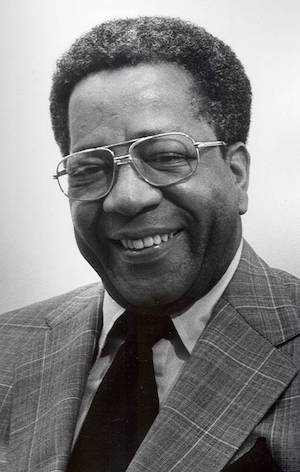
Samuel Eugene Kelly, soldier and educator, was born in Greenwich, Connecticut on January 26, 1926 to James Handy Kelly, a minister, and Essie Matilda Allen-Kelly, a homemaker. Educated at Greenwich public schools, Kelly dropped out of high school in 1943 and joined the United States Army the following year. Although he entered the Army as an eighteen-year-old private, fifteen months later he had completed Officer Candidate School at Fort Benning, Georgia, and in August 1945 was commissioned a Second Lieutenant. With World War II over in the same month, Kelly became part of the U.S. occupying forces in Japan, serving there until 1950.
After the Korean conflict began Kelly was assigned to South Korea in 1951, where he became one of the first African American officers to command an integrated combat unit. He fought in Korea for the next sixteen months, facing both North Korean and Chinese Army troops. In 1950, Kelly married Joyce Estella Lyle. The couple had three children, William Lyle Kelly (1952), and twins Brenda Joyce and Sharon Yvonne (1956).
Kelly returned to the United States in 1952, and two years later joined the 188th Airborne Regimental Combat Team at Fort Campbell, Kentucky. He also took other assignments that led to his promotion through the ranks to Colonel in 1966. His last post before retirement was Fort Lewis, Washington.
Kelly continued to pursue educational credentials while in the Army. In 1948 he completed high school and in 1959 he received a B.A. in history from West Virginia State. One year later he received an M.A. in history from Marshall University in Huntington, West Virginia.
Upon retiring from the U.S. Army in 1966, Kelly became an educator. At the age of 40 he became the first African American hired in the Washington State Community College System when he began teaching at Everett Junior College in Everett, Snohomish County, Washington. By 1967 Kelly had begun teaching history at Shoreline Community College in Shoreline, Washington, where he developed one of the first Black Studies programs in the United States. Kelly was also a member of Omega Psi Phi and Sigma Pi Phi fraternities.
Because of his profile at Shoreline Community College, in 1970 Kelly was hired as the first Vice President for Minority Affairs at the University of Washington. Although the post did not require another degree, Kelly, despite the demands of a full-time administrative post, enrolled in the Ph.D. program at the University of Washington, completing the degree in 1971. He was also appointed to the faculty of the College of Education that same year.
Kelly remained at the University of Washington until 1982. Heading the Office of Minority Affairs during the 1970s, he fashioned policies to bring thousands of students of color and economically disadvantaged white students to the University of Washington, while he helped the institution establish a commitment to diversify its student body, faculty, administrators and staff long before the concept was popular at most American colleges and universities.
After the death of his first wife, Kelly married Donna Schaplow, an administrator in the University of Washington personnel department. The couple had one son, Samuel Eugene Kelly, Jr., born in 1985.
In 1991 Kelly began a third career as a teacher-administrator at Portland OIC/Rosemary Anderson Middle and High School in Portland, Oregon. For the next thirteen years he helped troubled inner city students complete high school, while he led successful fundraising campaigns to expand the school’s programs. In 2004, at the age of 78, Kelly retired as President/CEO of the Anderson School.
Dr. Samuel Kelly passed away on Monday, July 6, 2009 at his home in Redmond, Washington. He was 83.

